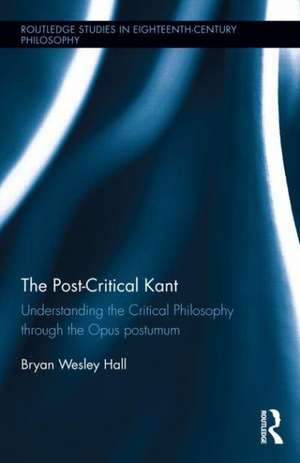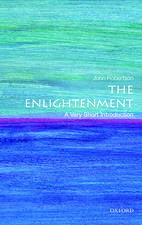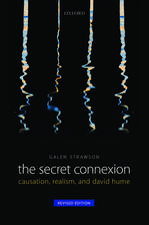The Post-Critical Kant: Understanding the Critical Philosophy through the Opus Postumum: Routledge Studies in Eighteenth-Century Philosophy
Autor Bryan Hallen Limba Engleză Hardback – 23 oct 2014
In letters from 1798, Kant claims to have discovered a "gap" in the Critical philosophy that requires effecting a "transition from the metaphysical foundations of natural science to physics"; unfortunately, Kant does not make clear exactly what this gap is or how the transition is supposed to fill the gap. To resolve these issues, Hall draws on the Opus Postumum, arguing that Kant’s transition project can solve certain perennial problems with the Critical philosophy. This volume provides a powerful alternative to all current interpretations of the Opus Postumum, arguing that Kant’s transition project is best seen as the post-Critical culmination of his Critical philosophy. Hall carefully examines the deep connections between the Opus Postumum and the view Kant develops in the Critique of Pure Reason, to suggest that properly understanding the post-Critical Kant will significantly revise our view of Kant’s Critical period.
| Toate formatele și edițiile | Preț | Express |
|---|---|---|
| Paperback (1) | 436.14 lei 43-57 zile | |
| Taylor & Francis – 24 ian 2018 | 436.14 lei 43-57 zile | |
| Hardback (1) | 1109.18 lei 43-57 zile | |
| Taylor & Francis – 23 oct 2014 | 1109.18 lei 43-57 zile |
Din seria Routledge Studies in Eighteenth-Century Philosophy
-
 Preț: 326.49 lei
Preț: 326.49 lei -
 Preț: 311.33 lei
Preț: 311.33 lei -
 Preț: 311.41 lei
Preț: 311.41 lei - 9%
 Preț: 934.94 lei
Preț: 934.94 lei -
 Preț: 389.66 lei
Preț: 389.66 lei -
 Preț: 383.63 lei
Preț: 383.63 lei -
 Preț: 447.17 lei
Preț: 447.17 lei -
 Preț: 482.78 lei
Preț: 482.78 lei -
 Preț: 436.14 lei
Preț: 436.14 lei -
 Preț: 389.66 lei
Preț: 389.66 lei - 18%
 Preț: 1001.84 lei
Preț: 1001.84 lei - 16%
 Preț: 276.49 lei
Preț: 276.49 lei -
 Preț: 326.49 lei
Preț: 326.49 lei -
 Preț: 410.46 lei
Preț: 410.46 lei -
 Preț: 436.14 lei
Preț: 436.14 lei -
 Preț: 427.95 lei
Preț: 427.95 lei - 18%
 Preț: 890.74 lei
Preț: 890.74 lei -
 Preț: 405.66 lei
Preț: 405.66 lei - 17%
 Preț: 259.31 lei
Preț: 259.31 lei -
 Preț: 385.41 lei
Preț: 385.41 lei - 16%
 Preț: 275.88 lei
Preț: 275.88 lei - 18%
 Preț: 1002.80 lei
Preț: 1002.80 lei -
 Preț: 286.51 lei
Preț: 286.51 lei -
 Preț: 389.66 lei
Preț: 389.66 lei -
 Preț: 490.25 lei
Preț: 490.25 lei - 16%
 Preț: 260.13 lei
Preț: 260.13 lei - 18%
 Preț: 1000.27 lei
Preț: 1000.27 lei - 18%
 Preț: 882.69 lei
Preț: 882.69 lei -
 Preț: 432.20 lei
Preț: 432.20 lei - 18%
 Preț: 1005.17 lei
Preț: 1005.17 lei - 9%
 Preț: 870.32 lei
Preț: 870.32 lei
Preț: 1109.18 lei
Preț vechi: 1352.65 lei
-18% Nou
Puncte Express: 1664
Preț estimativ în valută:
212.26€ • 220.26$ • 177.42£
212.26€ • 220.26$ • 177.42£
Carte tipărită la comandă
Livrare economică 17-31 martie
Preluare comenzi: 021 569.72.76
Specificații
ISBN-13: 9781138802148
ISBN-10: 113880214X
Pagini: 230
Ilustrații: 3 black & white illustrations, 3 black & white line drawings
Dimensiuni: 152 x 229 x 18 mm
Greutate: 0.45 kg
Ediția:1
Editura: Taylor & Francis
Colecția Routledge
Seria Routledge Studies in Eighteenth-Century Philosophy
Locul publicării:Oxford, United Kingdom
ISBN-10: 113880214X
Pagini: 230
Ilustrații: 3 black & white illustrations, 3 black & white line drawings
Dimensiuni: 152 x 229 x 18 mm
Greutate: 0.45 kg
Ediția:1
Editura: Taylor & Francis
Colecția Routledge
Seria Routledge Studies in Eighteenth-Century Philosophy
Locul publicării:Oxford, United Kingdom
Public țintă
Postgraduate and UndergraduateCuprins
Introduction 1. A Dilemma for Kant’s Theory of Substance 2. The Development of Kant’s Ether Theory 3. Kant’s Ether Deduction 4. Kant’s Transition Project in Convoluts 10-11 5. Kant and the Problem of Affection Conclusion
Recenzii
"The interpretive principles and the results of his work will be influential in research on Kant's last drafts for years to come." –Veit Justus Rollmann, Notre Dame Philosophical Review
"In this book Bryan Hall has followed up his articles on Kant's post-Critical writings to focus on the familiar puzzle of a supposed 'gap' in the Critical work, which the Opus Postumum was designed to bridge. His book promises to throw real light on Kant's later work and its controversial relation to the earlier Critiques."—Graham Bird, Emeritus Professor of Philosophy, Manchester University, UK
"After the publication of the B edition of the Critique of Pure Reason in 1787, Kant gradually came to the realization that there is a fundamental "gap" in his explanation of transcendental idealism; and in his final unfinished "Transition" project of the late 1790s and early 1800s, now known as the Opus postumum, he tried desperately to close this gap. Bryan Hall’s The Post-Critical Kant explores this profound problem in Kant’s metaphysics and epistemology in a highly thoroughgoing, incisive, and compelling way that will at the very least significantly inflect, and perhaps even drastically change, our conception of the Critical philosophy itself." –Robert A. Hanna, Professor of Philosophy, University of Colorado, USA
"A great new challenge in interpreting the still enigmatic aim of Kant’s Opus postumum in line with the Critique of Pure Reason, attempting to solve its "problems" in the Analogies of Experience." –Ernst-Otto Onnasch, Assistant Professor of Philosophy, Utrecht University, Netherlands
"Hall’s study offers a very clear, rigorous, stimulating and original attempt to reconstruct the systematic continuity between Kant’s critical and post-critical philosophy, rightly emphasizing the central meaning of the a priori concept of the ether in OP." –Giovanni Pietro Basile, Journal of the History of Philosophy
"In this book Bryan Hall has followed up his articles on Kant's post-Critical writings to focus on the familiar puzzle of a supposed 'gap' in the Critical work, which the Opus Postumum was designed to bridge. His book promises to throw real light on Kant's later work and its controversial relation to the earlier Critiques."—Graham Bird, Emeritus Professor of Philosophy, Manchester University, UK
"After the publication of the B edition of the Critique of Pure Reason in 1787, Kant gradually came to the realization that there is a fundamental "gap" in his explanation of transcendental idealism; and in his final unfinished "Transition" project of the late 1790s and early 1800s, now known as the Opus postumum, he tried desperately to close this gap. Bryan Hall’s The Post-Critical Kant explores this profound problem in Kant’s metaphysics and epistemology in a highly thoroughgoing, incisive, and compelling way that will at the very least significantly inflect, and perhaps even drastically change, our conception of the Critical philosophy itself." –Robert A. Hanna, Professor of Philosophy, University of Colorado, USA
"A great new challenge in interpreting the still enigmatic aim of Kant’s Opus postumum in line with the Critique of Pure Reason, attempting to solve its "problems" in the Analogies of Experience." –Ernst-Otto Onnasch, Assistant Professor of Philosophy, Utrecht University, Netherlands
"Hall’s study offers a very clear, rigorous, stimulating and original attempt to reconstruct the systematic continuity between Kant’s critical and post-critical philosophy, rightly emphasizing the central meaning of the a priori concept of the ether in OP." –Giovanni Pietro Basile, Journal of the History of Philosophy
Descriere
In this book, Bryan Wesley Hall breaks new ground in Kant scholarship, exploring the gap in Kant’s Critical philosophy in relation to his post-Critical work by turning to Kant’s final, unpublished work, the so-called Opus Postumum. This volume provides a powerful alternative to all current interpretations of the Opus Postumum, arguing that Kant’s transition project is best seen as the post-Critical culmination of his Critical philosophy. Hall carefully examines the deep connections between the Opus Postumum and the view Kant develops in the Critique of Pure Reason, to suggest that properly understanding the post-Critical Kant will significantly revise our view of Kant’s Critical period.
"Hall’s study offers a very clear, rigorous, stimulating and original attempt to reconstruct the systematic continuity between Kant’s critical and post-critical philosophy, rightly emphasizing the central meaning of the a priori concept of the ether in OP [Opus Postumum]." - Giovanni Pietro Basile, Hochschule für Philosophie München
"Hall’s study offers a very clear, rigorous, stimulating and original attempt to reconstruct the systematic continuity between Kant’s critical and post-critical philosophy, rightly emphasizing the central meaning of the a priori concept of the ether in OP [Opus Postumum]." - Giovanni Pietro Basile, Hochschule für Philosophie München


















